Movie Review: The Last Duel Starring Matt Damon
The Last Duel ripples with powerful metaphors about modern society.

The Last Duel stars Jody Comer as Marguerite, a daughter of privilege traded like property to Squire and future Knight, Jean De Carrouges (Matt Damon). She’s also the object of the affections of Carrouges' long time friend turned enemy, Jacques LeGris (Adam Driver). In the course of The Last Duel we will see the same story told from each of these three perspectives but only Marguerite’s is actually treated as ‘The Truth.’
We begin with the story from the perspective of Jean De Carrouges, a humble Squire and maniac warrior who bravely rides into battle over the objections of his superiors, in order to avenge the deaths of innocents. The move costs his side the bridge they were supposed to hold at the direction of Count Pierre D’Alencon (Ben Affleck), but in Jean’s telling the victory lies in fighting valiantly as others retreat from the fight. This embellishment on the part of Jean is the first of several savvy storytelling touches in all three of the stories that make up The Last Duel. The screenplay continually demonstrates men portraying their failings as virtues, allowing the characters to undermine themselves to a comic degree.
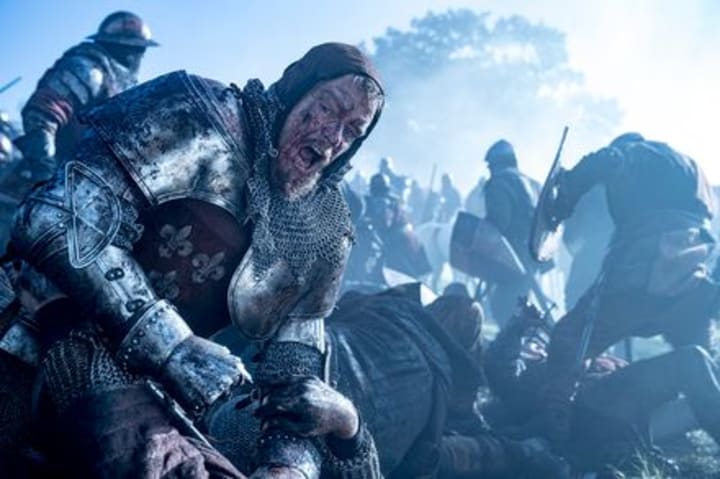
From there, Jean lays it on thick how he has been repeatedly persecuted despite his bravery in battle and noble, romantic bearing. Though he and Jacques LeGris were as close as brothers, especially after Jean heroically saved Jacques’ life in battle, somehow Jacques gains the favor of Pierre and the spoils of his favor. While Jean struggles to get by, Jacques is given every privilege. This eventually includes the awarding of Jean's supposed birthright, a military fortress and Captaincy held by Jean's father, to Jacques.
The wedge between Jean and Jacques only grows stronger after Jean is wed to Marguerite, a marriage that Jean portrays as a wholesome and loving romance with him as a doting and devoted husband. Marguerite’s beauty stokes Jacques’ jealousy while a battle over land that Jean believes should belong to him is also awarded to Jacques, furthering their growing blood feud. Again and again, Jean suffers supposed slights but the cleverly told story leaves out key portions of the story that would show Jean in a less than flattering light. The two other stories of The Last Duel include those scenes, building brilliantly to the final story which appears more true by how obviously the other stories embellish and flatter.
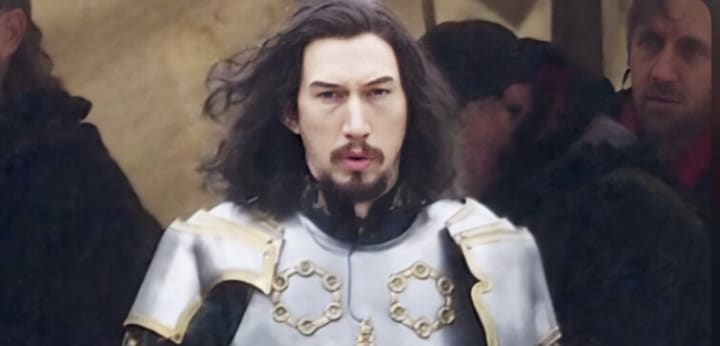
All three stories in The Last Duel hinge on an accusation that Jacques had gone to Jean’s castle while he was away and while Marguerite was home alone. Jacque rapes Marguerite and when Marguerite tells Jean what happened, he demands satisfaction. Going around Affleck’s powerful Count and directly to the sniveling King of France, expertly played as a little weasel by Alex Lawther, Jean demands a trial and a duel to the death with his former friend.
Naturally, the second story of The Last Duel is Jacques’ version of events, a version where he is a dashing ladies man and hero. He portrays Jean as the one needing saving in battle and appears to relish the moments when Jean humiliates himself at court while demanding the land and rights he feels he is owed. Jacques is happily debauched engaging in all sorts of bacchanalia alongside Count Pierre, including more than one orgy. Then Jacques meets Marguerite and claims that he’s fallen in love with her.
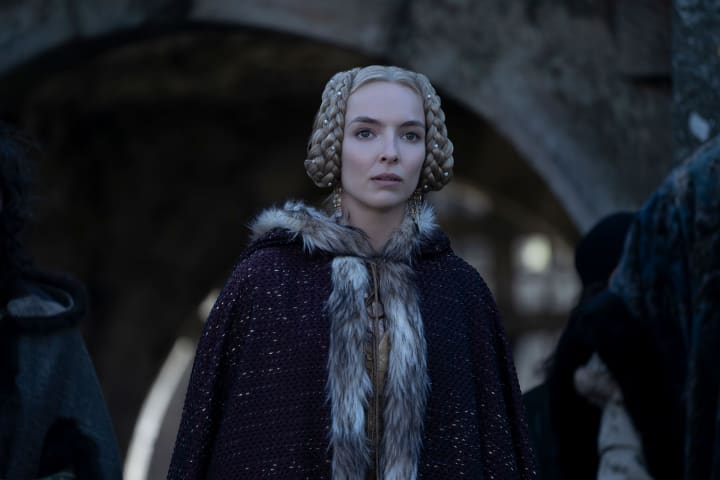
Even in his account of matters he admits to raping Marguerite though, in his mind, she was only protesting out of propriety as a married woman and that she really was as eager as he was. When he’s told of her accusation he follows Count Pierre’s advice to say that nothing happened and then he tries to weasel his way out of the trial by using the church to try and shame Marguerite into admitting she willingly carried on the affair.
The final account, the truth, is that of Marguerite who sees both of these men as the childish man babies they are. In her account Jean is not a loving husband but a man desperate for a male child to carry on his name, a brutal and ineffective lover, and a man of desperately wounded pride. As for Jacques, she sees him as the duplicitous cad that he openly admits he is. Only in her account of the story do we see the rape for as brutal and ugly as it truly was and even then, her treatment after the rape and the accusation only grows more disturbing and shocking.
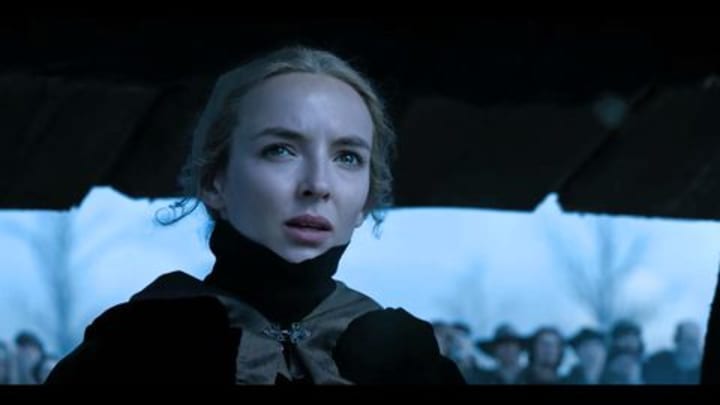
Jody Comer is incredible in these scenes as she struggles to maintain her dignity amid betrayals by friends taking sides at court, advice from her shrew of a mother in law to simply take back the accusation and pretend the rape never happened, and her husband’s own violent reaction to her accusation, a rage based far more in how much of an insult the rape is to him than in how his wife has been violated and deeply harmed.
The critique of masculinity and fragile male egos in The Last Duel is rather delightful considering the deep dark tone of the movie and the deathly seriousness of the central conceit regarding a brutal sexual assault. The film throws a light on toxic masculinity that people assume is 800 plus years in the past but still peaks its head up in this day and age. Never forget that we are merely years removed from the last time a lawyer asked a sexual assault victim what she was wearing when she was assaulted. Toxic masculinity has been with us forever and has never left.
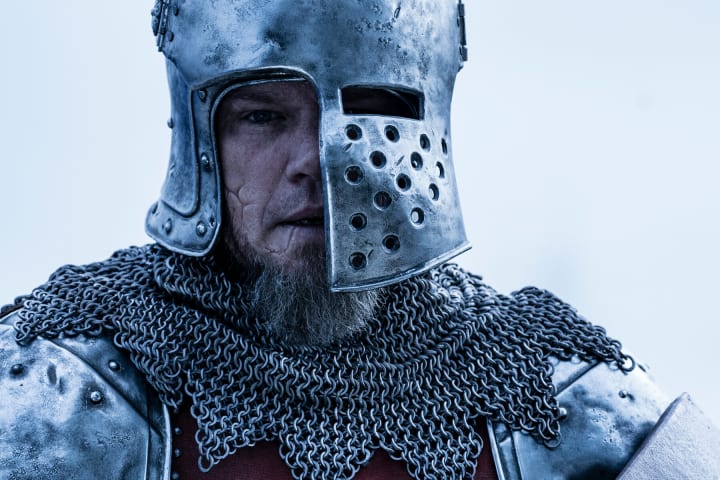
That’s a bold theme coming from two male writers and a male director with the brilliant Nicole Holofcener the only distaff member of the creative team. Naturally, they will be accused of being woke and when the movie inevitably bombs at the box office, being a 2 and a half hour period piece in the day and age of Tik Tok, that wokeness will be cited as the reason. Regardless of what the trolls will say however, it’s bold to weave these themes into the all too macho genre of swords and armor.
The Last Duel is smart, witty and exciting without ever failing to take seriously the fact that this story is about a woman who has not only been sexually assaulted but repeatedly degraded by all aspects of the society she’s trapped within. It’s a near perfect metaphor for how modern women are often treated by our media, especially our social media, and our supposedly modern society. You think things have changed some 800 years later but all that has changed is the technology and the fact that today there are a growing number of people capable of pushing back against the patriarchal B.S that still dominates our culture today, especially in positions of power.
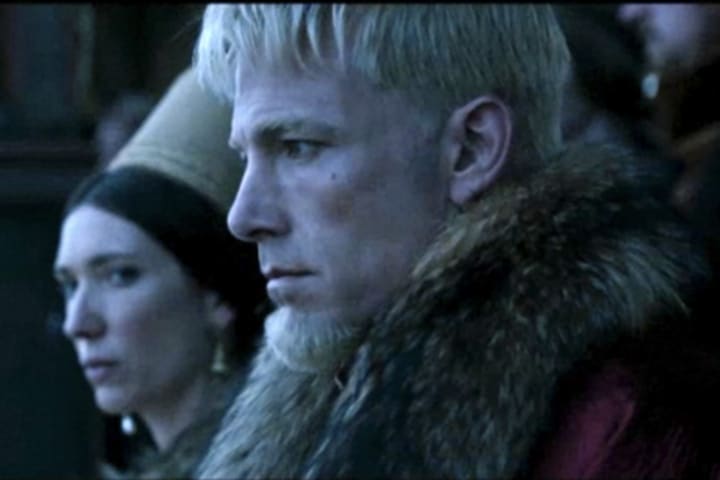
The Last Duel isn’t perfect but it’s a very strong effort, a powerful attempt at making a statement that many would prefer not be made so loudly and boldly. We are meant to be shocked by what we see in The Last Duel, recoiling at the blatant ignorance and misogyny of the leadership class while hopefully it dawns on you that this mistreatment of women is still being visited on women today when they decide to stand up for themselves and speak out against being mistreated.
In this way, The Last Duel is powerful and more valuable than being merely an epic from one of the most well known creative teams in history. The Last Duel arrived in theaters on October 15th.
About the Creator
Sean Patrick
Hello, my name is Sean Patrick He/Him, and I am a film critic and podcast host for the I Hate Critics Movie Review Podcast I am a voting member of the Critics Choice Association, the group behind the annual Critics Choice Awards.






Comments
There are no comments for this story
Be the first to respond and start the conversation.